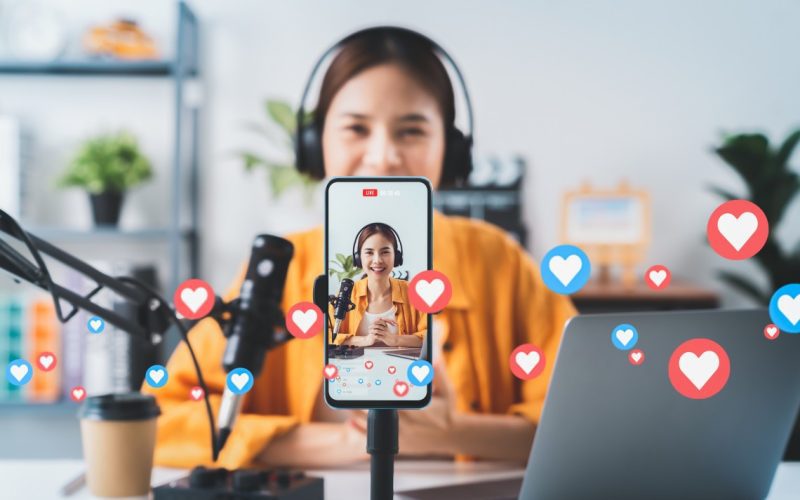Introduction
The digital age has brought about a seismic shift in the way brands and businesses approach marketing. Traditional advertising methods, while still relevant, are increasingly being supplemented and sometimes even replaced by digital strategies that leverage the power of social media influencers. This evolution is particularly pronounced in the entertainment industry, where influencer marketing has grown exponentially over the past decade. This article delves into the growth of influencer marketing in entertainment, exploring its origins, current trends, benefits, challenges, and future prospects.
The Origins of Influencer Marketing

-
Early Beginnings
Influencer marketing is not a new concept. The idea of leveraging influential figures to promote products dates back centuries. From royal endorsements to celebrity sponsorships, the power of influence has always been a valuable asset in marketing. However, the digital revolution has transformed this age-old practice into a sophisticated and highly effective marketing strategy.
-
The Rise of Social Media
The advent of social media platforms like Facebook, Instagram, YouTube, and TikTok has democratized influence. No longer confined to celebrities and public figures, ordinary individuals with a knack for creating engaging content can now amass large followings and wield significant influence. This shift has given rise to a new breed of influencers who play a pivotal role in shaping consumer behavior and trends.
The Intersection of Influencer Marketing and Entertainment

-
Entertainment Industry Dynamics
The entertainment industry, encompassing film, television, music, and digital content, is inherently reliant on public perception and engagement. As such, it is a fertile ground for influencer marketing. Whether it’s promoting a new movie, launching a music album, or driving viewership for a TV show, influencers have become indispensable in amplifying reach and impact.
-
Case Studies
- Film Promotions: One of the most notable examples of influencer marketing in the film industry is the promotional campaign for the movie “Deadpool.” The film’s marketing team leveraged influencers across various platforms to create buzz and anticipation. From exclusive interviews to behind-the-scenes content, influencers played a crucial role in driving the film’s success.
- Music Industry: In the music industry, influencers are often tapped to promote new releases and concerts. For instance, the launch of Taylor Swift’s album “Reputation” saw a coordinated effort involving influencers who shared exclusive content and personal stories related to the album, thereby creating a viral marketing campaign.
Current Trends in Influencer Marketing in Entertainment

-
Micro-Influencers
While mega-influencers and celebrities continue to hold sway, there is a growing trend towards micro-influencers. These are individuals with smaller but highly engaged followings. Brands in the entertainment industry are increasingly recognizing the value of micro-influencers in driving authentic engagement and conversions.
-
Video Content
Video content, especially on platforms like YouTube and TikTok, is dominating the influencer marketing landscape. From movie trailers to music videos, influencers are creating and sharing video content that resonates with their audiences and drives engagement.
-
Live Streaming
Live streaming has emerged as a powerful tool for influencer marketing in entertainment. Platforms like Instagram Live, Twitch, and YouTube Live enable influencers to connect with their audiences in real-time, offering a level of authenticity and immediacy that is highly effective in promoting entertainment content.
Benefits of Influencer Marketing in Entertainment

-
Enhanced Reach and Engagement
Influencers have the ability to reach large and diverse audiences. Their followers often trust their recommendations, leading to higher engagement rates compared to traditional advertising methods.
-
Cost-Effective
Compared to traditional advertising channels, influencer marketing can be more cost-effective. Brands can achieve significant reach and impact with relatively lower budgets by partnering with the right influencers.
-
Authenticity and Trust
Influencers often have a personal connection with their followers, which translates to higher levels of trust and authenticity. This is particularly valuable in the entertainment industry, where consumer trust is paramount.
Challenges in Influencer Marketing in Entertainment

-
Identifying the Right Influencers
One of the biggest challenges is identifying influencers who align with the brand’s values and target audience. This requires thorough research and due diligence.
-
Measuring ROI
Measuring the return on investment (ROI) of influencer marketing campaigns can be complex. Brands need to establish clear metrics and track performance to ensure that their investment is yielding the desired results.
-
Navigating Regulations
The influencer marketing landscape is subject to regulations and guidelines, particularly around disclosure and transparency. Brands and influencers need to navigate these regulations carefully to avoid legal pitfalls.
Future Prospects

-
Technological Advancements
Advancements in technology, such as artificial intelligence and data analytics, are set to revolutionize influencer marketing. These technologies can help brands identify the right influencers, optimize campaigns, and measure performance more effectively.
-
Integration with Other Marketing Channels
Influencer marketing is increasingly being integrated with other marketing channels, such as email marketing, content marketing, and paid advertising. This holistic approach can amplify the impact of influencer campaigns.
-
Evolving Content Formats
As new content formats and platforms emerge, influencer marketing in entertainment will continue to evolve. Brands need to stay abreast of these trends and adapt their strategies accordingly.
Conclusion
The growth of influencer marketing in entertainment is a testament to the power of influence in the digital age. As the landscape continues to evolve, brands in the entertainment industry must embrace innovative strategies and leverage the unique strengths of influencers to stay ahead of the curve. With the right approach, influencer marketing can drive significant value and propel the entertainment industry to new heights.












